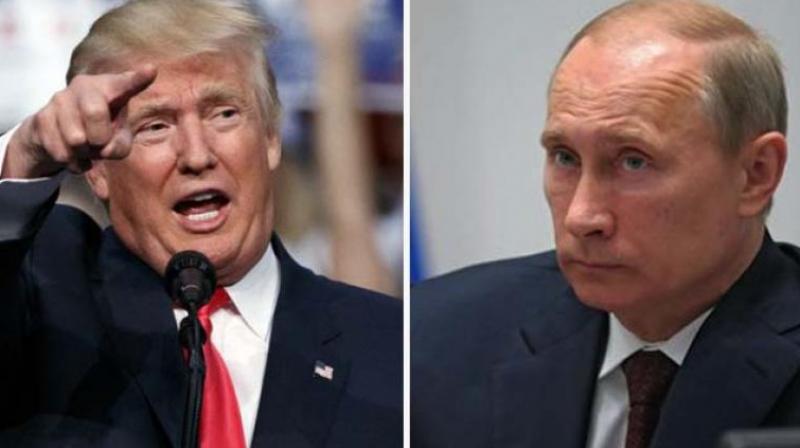Trump eager to meet President Putin at Germany summit, US officials wary

Washington: President Donald Trump is eager to meet Russian President Vladimir Putin with full diplomatic bells and whistles when the two are in Germany for a multinational summit next month.
But the idea is exposing deep divisions within the administration on the best way to approach Moscow in the midst of an ongoing investigation into Russian meddling in the US elections.
Many administration officials believe the US needs to maintain its distance from Russia at such a sensitive time and interact only with great caution. But Trump and some others within his administration have been pressing for a full bilateral meeting.
He's calling for media access and all the typical protocol associated with such sessions, even as officials within the State Department and National Security Council urge more restraint, according to a current and a former administration official.
Some advisers have recommended that the president instead do either a quick, informal "pull-aside" on the sidelines of the summit, or that the US and Russian delegations hold "strategic stability talks," which typically don't involve the presidents. The officials spoke anonymously to discuss private policy discussions.
The contrasting views underscore differing views within the administration on overall Russia policy, and Trump's eagerness to develop a working relationship with Russia despite the ongoing investigations.
Asked about the AP report that Trump is eager for a full bilateral meeting, Putin's spokesman Dmitry Peskov told reporters in Moscow on Monday that "the protocol side of it is secondary."
The two leaders will be attending the same event in the same place at the same time, Peskov said, so "in any case there will be a chance to meet." Peskov added, however, that no progress in hammering out the details of the meeting has been made yet.
There are potential benefits to a meeting with Putin. A face-to-face meeting can humanize the two sides and often removes some of the intrigue involved in impersonal, telephone communication.
Trump the ultimate dealmaker has repeatedly suggested that he can replace the Obama-era damage in the US-Russia relationship with a partnership, particularly on issues like the ongoing Syria conflict.
There are big risks, though. Trump is known to veer off- script, creating the possibility for a high-stakes diplomatic blunder.
In a brief Oval Office meeting with top Russian diplomats last month, Trump revealed highly classified information about an Islamic State group threat to airlines that was relayed to him by Israel, according to a senior administration official.
The White House defended the disclosures as "wholly appropriate." In addition, many observers warn that Putin is not to be trusted.
Oleg Kalugin, a former general with Russia's main security agency, known as the KGB, said Putin, a shrewd and experienced politician, has "other priorities" than discussing the accusations that Russia hacked the US election with Trump, such as easing sanctions, raising oil prices, as well as next year's presidential elections in Russia.
"Putin knows how to redirect a conversation in his favour," Kalugin said. Nina Khrushcheva, a Russian affairs professor at the New School, said Trump is in an "impossible position." "He can't be too nice to Putin because it's going to be interpreted in a way that suggests he has a special relationship with Russia," she said.
"He can't be too mean because Putin has long arms and KGB thinking. So Trump needs to have a good relationship with him but he also needs to fulfil his campaign promises of establishing better relations with Russia."
The White House said no final decision has been made about whether a meeting will take place. It did not respond to questions about the opposing views within the administration.

